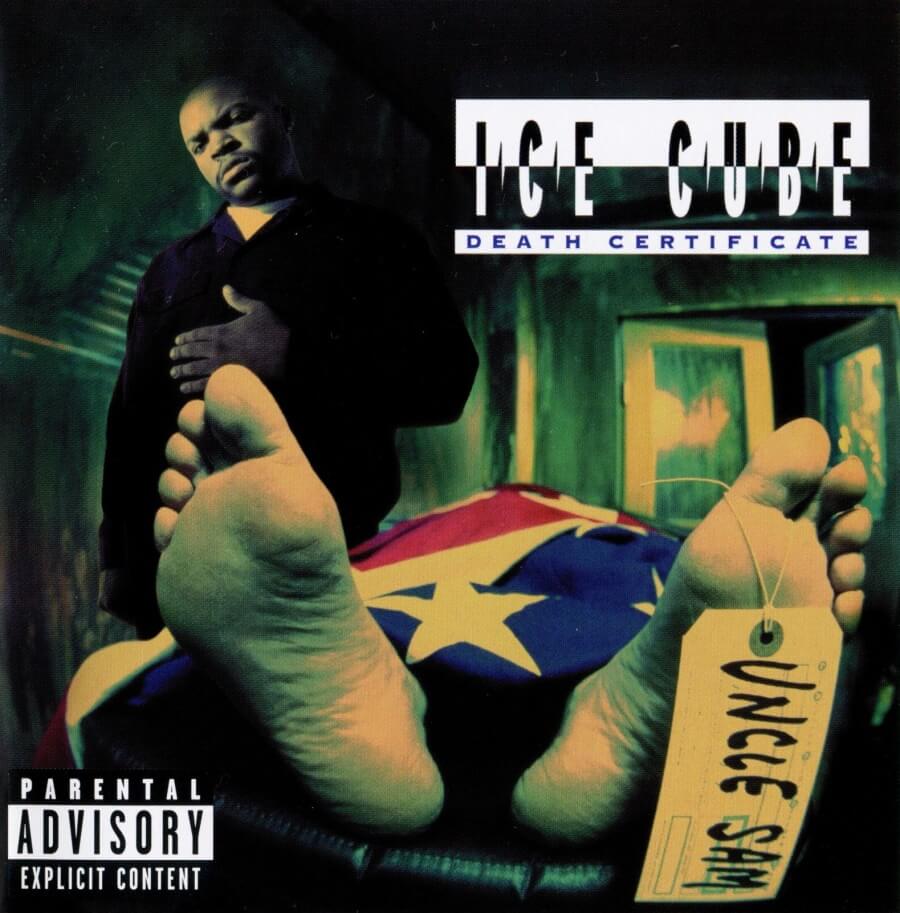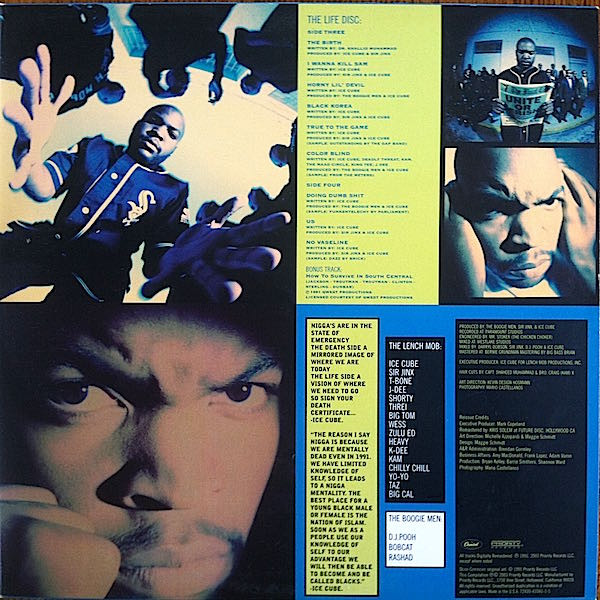
Ice Cube’s sophomore solo album Death Certificate hit the streets in ’91 and shook the foundations of Hip Hop – a raw, unapologetic manifesto that solidified Ice Cube as one of the most important voices in the game. Coming off his split from N.W.A. and the success of his solo debut AmeriKKKa’s Most Wanted (1990), Cube had something to prove. And boy, did he deliver. Death Certificate is like a punch to the gut – hard-hitting, uncompromising, and impossible to ignore.
The album’s structure is genius. Divided into “The Death Side” and “The Life Side,” it takes you on a journey through the harsh realities of inner-city life and the resilience of Black culture. It’s like Cube’s holding up a mirror to society, and the reflection isn’t pretty. Things kick off with “The Funeral” – the intro track that sets the tone for the whole album. That funeral march is haunting, mourning the loss of Black lives to police brutality and gang violence. But it isn’t wallowing in despair – it’s a call to arms, a wake-up call for listeners to take action. And when it leads into “The Wrong N**** to F*** Wit,” you know Cube ain’t playing around.
On “The Death Side,” Cube paints a grim picture of life in the hood. Take “Alive on Arrival” – a track that exposes the healthcare disparities faced by Black folks. Cube’s storytelling is vivid, putting you right in the middle of an emergency room where Black patients are treated like second-class citizens. It’s uncomfortable, it’s infuriating, and it’s real as hell. But it isn’t all doom and gloom. “Steady Mobbin'” is a standout track that showcases Cube’s skills as an emcee. His flow is smooth, his wordplay is sharp, and he embodies the spirit of gangsta rap like nobody else. It’s the kind of track that’ll have your head nodding even as you’re processing the heavy subject matter.
Flipping to “The Life Side,” Cube switches gears to celebrate Black culture and pride. Ice Cube takes a more positive approach, addressing issues such as love, family, and community. The songs on this side of the album provide a contrast to the more negative themes of the “Death Side”.
A standout on this side is the all-star posse cut “Color Blind”, a powerful commentary on the dangers of gang violence, with the title alluding to the colors used to represent different gangs. Other highlights include “True to the Game”, in which Ice Cube comes at those who prioritize following fads and trends over staying true to themselves, a powerful call to action for listeners to embrace their individuality and resist societal pressure to conform; and “Us”, which tackles issues such as gang violence, drug dealing, materialism, and jealousy, with Ice Cube highlighting how these factors contribute to the community’s struggles, holding up a mirror to himself and his peers, challenging them to do better.
“No Vaseline” is the last and one of the most famous tracks on the album, a vicious diss track directed at former N.W.A. bandmates, Eazy-E, Dr. Dre, and MC Ren. The song was a response to the disses on tracks that they had released about Ice Cube after he left the group. “No Vaseline” accuses them of stealing his lyrics and profiting off of his talent, while also mocking their music and their personal lives. Cube goes for the jugular, dropping bars that are as hilarious as they are scathing.
What’s wild is how relevant Death Certificate still is today. Tracks like “I Wanna Kill Sam” and “A Bird in the Hand” tackle issues of systemic racism and economic inequality that are still at the forefront of national conversations. It’s a testament to Cube’s insight that these songs still hit hard over three decades later. Ice Cube proved that you could spit hard verses about street life while also addressing bigger societal issues.
Beyond its cultural impact, Death Certificate simply is a damn good album. Cube’s lyricism is at its peak here. His wordplay is clever, his storytelling is vivid, and his ability to switch between aggressive raps and introspective social commentary is unmatched. Every verse feels like it’s delivered with conviction and purpose. The album’s also got range. From the hard-hitting “The Wrong N**** to F*** Wit” to the more laid-back “Doing Dumb S***,” Cube shows he can ride any beat. And tracks like “Givin’ Up the Nappy Dug Out” prove he can get humorous without losing his edge. Some of the content on Death Certificate is controversial. Tracks like “Black Korea” have been criticized for promoting racial stereotypes. And some of the language and attitudes towards women are problematic by today’s standards. But despite its timeless aspects, this is an album of its time: Cube was giving voice to the anger and frustration felt in his community, raw and unfiltered.
Sir Jinx and DJ Pooh’s production on this album is top-notch too. The Bomb Squad’s influence is clear, with dense, layered beats that perfectly complement Cube’s aggressive delivery. From the funky basslines to the well-placed samples, every track bangs in its own unique way.
Death Certificate is a cultural artifact, a time capsule of a pivotal moment in Hip Hop and American history. It captures the anger, the pride, and the complexity of Black life in the early ’90s. It’s not always an easy listen, but it’s an essential one. So whether you’re revisiting it or checking it out for the first time: turn it up, let Cube’s razor-sharp lyrics wash over you, and prepare to be challenged, entertained, and educated. This album is proof that Hip Hop at its best can be more than music – it can be a powerful tool for social commentary and change.
Over three decades on, Death Certificate still hits hard. It’s raw, it’s real, and it’s a crucial piece of Hip Hop history. Ice Cube took all the promise he showed with N.W.A. and AmeriKKKa’s Most Wanted and cranked it up to eleven. The result? An album that changed the game and solidified Cube’s place as one of the greatest to ever pick up a mic. It’s not always comfortable, but it’s undeniably powerful. And in the world of Hip Hop, that’s what really counts.

